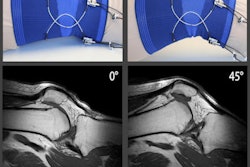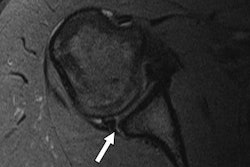Researchers from Boston University are developing a new magnetic metamaterial made of plastic and copper that could greatly improve the quality of MR images and reduce scan time.
The materials are used to create a ring-like structure called a helical resonator. The 3-cm structures are created from 3D-printed plastic and coils of thin copper wire and are grouped in an array that is flexible enough to cover a person's kneecap, abdomen, head, or any part of the body for MR imaging. The resonators interact with the magnetic field to boost the scanner's signal-to-noise (S/N) ratio.
To test the magnetic array, the team scanned chicken legs, tomatoes, and grapes using a 1.5-tesla scanner. They found that the magnetic metamaterial yielded a 4.2-fold increase in the S/N ratio, which would be close to 7-tesla level in creating more detailed MR images. Strengthening MRI's capabilities also could increase patient throughput with shorter scan times, according to the study published online March 26 in Communications Physics.
The developers hope to collaborate with other researchers to adapt their technology to other clinical applications.


.fFmgij6Hin.png?auto=compress%2Cformat&fit=crop&h=100&q=70&w=100)





.fFmgij6Hin.png?auto=compress%2Cformat&fit=crop&h=167&q=70&w=250)











